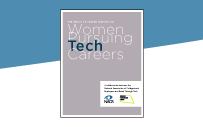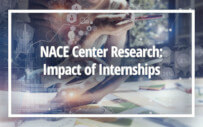
NACE surveyed early career professionals about their experiences and attitudes; in this article, we examine the effects of gender on the experiences of early career talent.

NACE surveyed early career talent—those who graduated in 2021, 2022, and 2023—to determine if (and how) experiential learning impacted their careers once they had graduated and landed in their first job. The results showed that those who took part in experiential learning while in college had higher rates of career satisfaction and a higher average salary than those who did not engage in experiential learning.

Nearly 85% of Class of 2023 bachelor’s degree graduates and nearly 90% of master’s degree graduates were employed or engaged in further education within six months of graduation.

For Spring Hill College, the work to attain a high knowledge rate on its first-destination survey begins in the fall.

Despite achieving a knowledge rate of 90.6% on its most recent first-destination survey, the Roanoke College career center is tweaking the survey’s process to improve it.

Centre College’s three-year average knowledge rate for its first-destination survey (FDS) stands at an impressive 98%. This is especially notable given that the survey wasn’t required for students until 2023.

After two relatively down years connected with the COVID-19 pandemic, the outcomes rate for Class of 2022 bachelor’s degree graduates returned to pre-pandemic levels.

A joint research project by the National Association of Colleges and Employers (NACE) and Break Through Tech uncovered the positive impact career services has on outcomes for women in general and for women pursuing tech careers in particular. The research is detailed in “The Impact of Career Services on Women Pursuing Tech Careers,” which is free to the public.

This study, a collaboration between NACE and Break Through Tech, provides evidence that career services can help level the playing field for women pursuing STEM careers.

Data provided by more than 2,300 bachelor’s degree-level graduating seniors who took part in NACE’s 2023 Student Survey demonstrate that systemic inequities continue to exist in internships—not only in terms of who takes part, but also in terms of who gets paid.

As we head into the warm days of the summer, the Class of 2023 is getting ready to make their mark on their first career destinations. They are starting careers in a world that is trying to emerge from a global pandemic but one that continues to grapple with social justice and equity.

The unusual and uncertain times experienced by the college Class of 2021 in its final year was reflected in its outcomes, which improved from last year, but remained down from pre-pandemic levels, according to NACE’s First Destinations for the College Class of 2021 report.

More than 80% of schools conducted first-destination surveys in 2021-22, according to NACE’s 2021-22 Career Services Benchmarks Survey Report.

In recent years, the overall knowledge rate of Davidson College’s first-destination survey (FDS) has been near or above 90%. Davidson has found several steps—such as getting an early start, using texts, and providing tailored information—to be helpful in attaining and maintaining a high FDS knowledge rate.

With no additional budget, Clarion’s Center for Career and Professional Development built and implemented a mentor program for students.

Schools that conduct an annual FDS to capture information on how their new college graduates fare following graduation can benefit their own institutions and demonstrate the value of higher education.

Free downloads from the NACE Center: These studies examine how internships impact the development and initial career outcomes of college graduates.

Using data from NACE’s 2016 Student Survey, NACE research looks at factors that may influence the job success of first-generation students.

Are students who repeat their internship experience with an organization more likely to convert to full-time hires? nearly 90 percent of eligible returning interns received an offer of full-time employment, and nearly 90 percent of those accepted. In comparison, just 43.5 percent of nonreturning interns were offered a job with their internship employer.

Students who took paid internships or co-ops were more likely to receive an offer of full-time employment and a higher salary offer from their employers than were students who took unpaid internships or co-ops, according to results of NACE’s Class of 2015 Student Survey.

The College Scorecard limits post-graduate information to salary for the school as a whole. In this article, NACE's research director looks at how three factors—type of school, demographics, and academic program—affect salary results.

This is the time to marry two potent forces in higher education—college to career readiness and systematic focus on shared institutional outcomes. Career services has much to offer as the whole campus aligns to assure that students graduate with experiences and credentials that reflect genuine capacities that will serve them well in securing work with solid prospects and lives of meaning and agency.

Nearly 60% of Class of 2019 bachelor’s grads were employed in full-time positions with a traditional employer and nearly 19% were going on for an advanced degree by the end of 2019.

Class of 2020 graduates got fewer jobs than any other class since NACE first began reporting on employment trends with the Class of 2014.

Results from NACE’s First Destinations Survey for the Class of 2020 reveal that the gap in pay between men and women begins right out of college—at the start of the career.

As was the case with bachelor’s level outcomes, the employment outcomes for graduates earning master’s degrees declined in 2020 in comparison with 2019.

Auburn University’s high knowledge rates on its recent first-destination surveys is driven by the survey being part of a course all students are required to take.